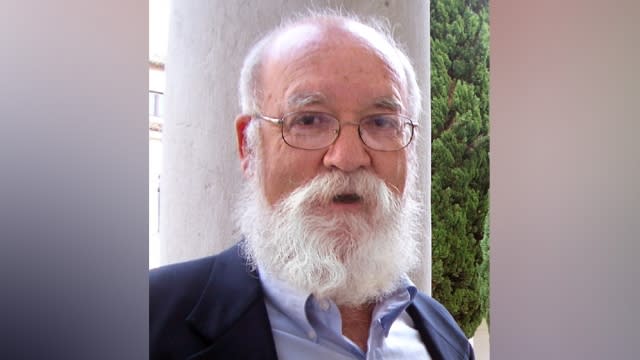Prolific atheist philosopher Daniel Dennett dies at 82

Tufts University called him a major intellectual figure globally with his research on the philosophy of mind, science and particularly on evolutionary biology. He was one of the most widely read and debated American philosophers of his time.
Daniel C. Dennett died on Friday in Portland, Maine at 82.
The American Philosophical Association released a statement saying the organization was saddened by his death. Dennett was the president of their Eastern Division from 2000-2001.
He served in a career with Tufts University for more than 50 years.
Born in Boston, Massachusetts on March 28, 1942, his father was a diplomat and a scholar of Islamic history. His mother was a teacher.
Dennett would go on to live a storied life filled with academic endeavors and successes, graduating from Harvard University in 1963 with a B.A. in philosophy, and then pursuing his graduate studies at the University of Oxford.
The New York Times reported that his death at Maine Medical Center was due to complications with interstitial lung disease, according to a message from his wife Susan Bell Dennett. They lived in Cape Elizabeth, Maine, the paper said.

Dennett was a faculty member at the University of California, Irvine from the mid-1960s until 1971.
He was convinced that the only way to have a productive philosophical debate about the mind was by being informed by science. He also believed this was the approach to sorting out debates on how the mind relates to the physical occurrences in the body.
Dennett also delved into the fields of neuroscience, artificial intelligence and cognitive psychology, and in 1993 he worked with a team at MIT to attempt the construction of an intelligent — possibly sentient — robot they named Cog.
Dennett was a prolific writer throughout his career with noteable works that included books on his theories on consciousness.
Consciousness Explained in 1991 and Darwin's Dangerous Idea in 1995 looked at the theory that natural selection accounted for the evolution of the brain and human consciousness. In a paper he wrote called "Where Am I?" he tells a story of how the brain and body could find itself separated and looks at how that might play out in the real and physical world.
Dennett believed that random chance played a significant role in decision making. He believed that it was more powerful in that regard that even passions, reasoning or motives.
At least 18 books have been written about Dennett and his work and he has appeared in a list of documentaries, including 1993's A Glorious Accident, Tufts wrote. He was elected to the American Academy of Arts and Sciences in 1987 and received multiple Guggenheim awards along with a fellowship at the Center for Advanced Study in the Behavioral Sciences.
He is survived by his wife Susan. The two were married for over 60 years. They have a son named Peter and a daughter named Andrea. Dennett is also survived by his six grandchildren and his two sisters.
